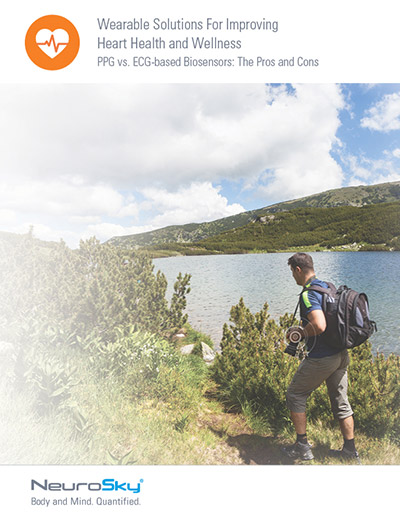If you’ve been following the advancements in ECG biosensor technology over the last few years, you’ve probably heard a little bit about heart rate variability (HRV). If you’re just getting up to speed, HRV is the method of measuring and assessing the effect that stress can have on your body. But how does HRV monitoring work, exactly? And what are the benefits of monitoring your HRV? We’ll be answering those questions here.
How do You Measure Heart Rate Variability?
Heart rate variability is measured by using an ECG Biosensor. An ECG, also known as an electrocardiogram, monitors a heart’s electrical and muscular functions. When attached to a person, an ECG biosensor is able to record electrical impulses that originate in the heart. The information collected from these electrical impulses—along with help from biometric algorithms—provides measurable, actionable data and insight on a person’s overall health and wellness.
When it Comes to HRV, What Are You Actually Measuring?
When measuring your heart rate variability, you’re determining the biopotential that is generated by the electrical signals controlling the contraction and expansion of the chambers of the heart. In doing so, you’re analyzing the variations in the amount of time between your heartbeats when you’re at rest, as well as your heart’s ability to speed up and slow down to effectively meet the physical demands of your body. A higher HRV indicates that a person is fit and healthy, while a lower HRV may indicate that you are fatigued or under stress. Regularly measuring your HRV over time helps you gain a clearer picture of your overall physical and mental health, as well as the impact stress, is having on your body.
What Are the Benefits of Measuring Your Heart Rate Variability?
Regularly measuring your HRV has a number of benefits, especially if you’re an athlete. That’s because it can help you better understand when your body needs to recover, and when you’re ready to train again. This is important because as any athlete (or physician, for that matter) will tell you, you don’t make progress when you’re training—you make progress while recovering.
So, if an athlete measures their HRV and determines that it is high, it means it’s an ideal time to train—they’re well rested, not suffering from stress, and their body is ready to benefit from time in the gym. On the flip side of this, if the same athlete measures their HRV and finds it to be low, they’ll know that their body is in recovery mode, and the smart thing to do is to relax and rest until they’re ready to go again.
A recent study has shown that—beyond helping discover the optimal time to train—heart rate variability monitoring is also a useful tool for determining whether or not an athlete is overtraining. This is valuable information as it can provide an athlete with an even clearer picture of when they should hit the gym for the most gains. At the same time, it can help them avoid injury by foregoing training and instead focusing on recovery when need be.
HRV Isn’t Just For Athletes
You don’t need to be a professional athlete to find benefit in measuring your heart rate variability. In fact, you don’t need to be an athlete at all! That’s because HRV monitoring can also be used to track stress levels and mental well-being. Consider that unchecked stress can impact everything from your blood pressure to your sleeping patterns, even causing headaches. Measuring your HRV can let you know when your body is experiencing stress, allowing you to develop a plan around your recovery and activity times—ensuring you’re taking on challenging tasks when your body and brain are ready.
Understanding when and why your body needs to rest and when it’s ready for activity is useful for everyone. Whether you’re a world-class athlete or an everyday man or woman, HRV monitoring gives you the tools you need to improve your own personal physical and mental wellbeing.
NeuroSky Brings HRV Monitoring Out of the Lab and Into Your Home
There was a time when HRV monitoring had to take place in a controlled environment, such as a lab, but NeuroSky’s CardioChip ECG and biometric algorithms have completely changed that. Now, accurate HRV data can be taken by a completely portable smart device, and getting a measurement is a relatively quick process. In fact, NeuroSky’s biometric algorithms can provide you with a highly accurate HRV measurement in 30 seconds.
Tracking HRV is changing the way everyone from world class athletes to first-time gym goers are thinking about training and improving their health. If you’re interested in learning more about HRV and overall heart health, be sure to download our FREE whitepaper, Wearable Solutions For Improving Heart Health and Wellness.



